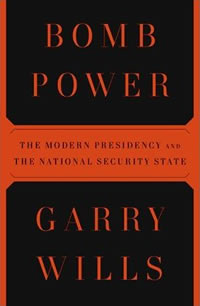Book Notes
 Garry Wills, Bomb Power; The Modern Presidency and the National Security State (New York: The Penguin Press, 2010), 278pp.
Garry Wills, Bomb Power; The Modern Presidency and the National Security State (New York: The Penguin Press, 2010), 278pp.
When the United States exploded the Bomb in the Nevada desert on July 16, 1945 (two months after Germany had surrendered), the atomic test not only proved a terrifying weapon of science, it culminated three years of a comprehensive secret process. According to Garry Wills, it was the secret process, more than the scientific product, that was more fateful. The drive for atomic supremacy and stockpiling was on, and by 1955 the United States had amassed 1,756 bombs with a total yield of 2,880 megatons, equal to 192,000 Hiroshimas (42). One person alone exercised sole authority over these Bombs, free from any legislative constraints — the president of the United States.
Bomb Power progressively evolved into a national security state of permanent war in a time of peace. This national security state, says Wills, was "riddled with illegalities from the start," unaccountable to Congress, secretly funded, and resorted to any and all means to accomplish its ends (sabotage, assassination, etc.). "It may be said — it has been said — that all governments do these things. But the United States had not done so in any systematic way before the period after World War II. And other countries do not have the United States Constitution" (99). This demise of presidential accountability destroys the very essence of democracy.
The "power of secrecy that enveloped the Bomb became a model for the planning or execution of Anything Important, as guarded by Important People" (137). If something is not secret then it is dismissed as unimportant. Those inside the loop disregard critics as uninformed or unpatriotic. Executive orders undermine legislation. Secrecy covers up bungled missions, deceives Congress and the citizenry, disables disagreeable policy, and conceals crimes. The misdeeds of secrecy are rarely punished, or punished only lightly. And so, writes Wills, the Bomb "altered our subsequent history down to its deepest constitutional roots," redefined the president as "a lone eminence above constitutional scrutiny," militarized our entire society and economy, marginalized Congress, and even "redefined the Supreme Court, as a follower of the follower of the executive." The Bomb was bad enough; the secrecy of its political process did far worse.


